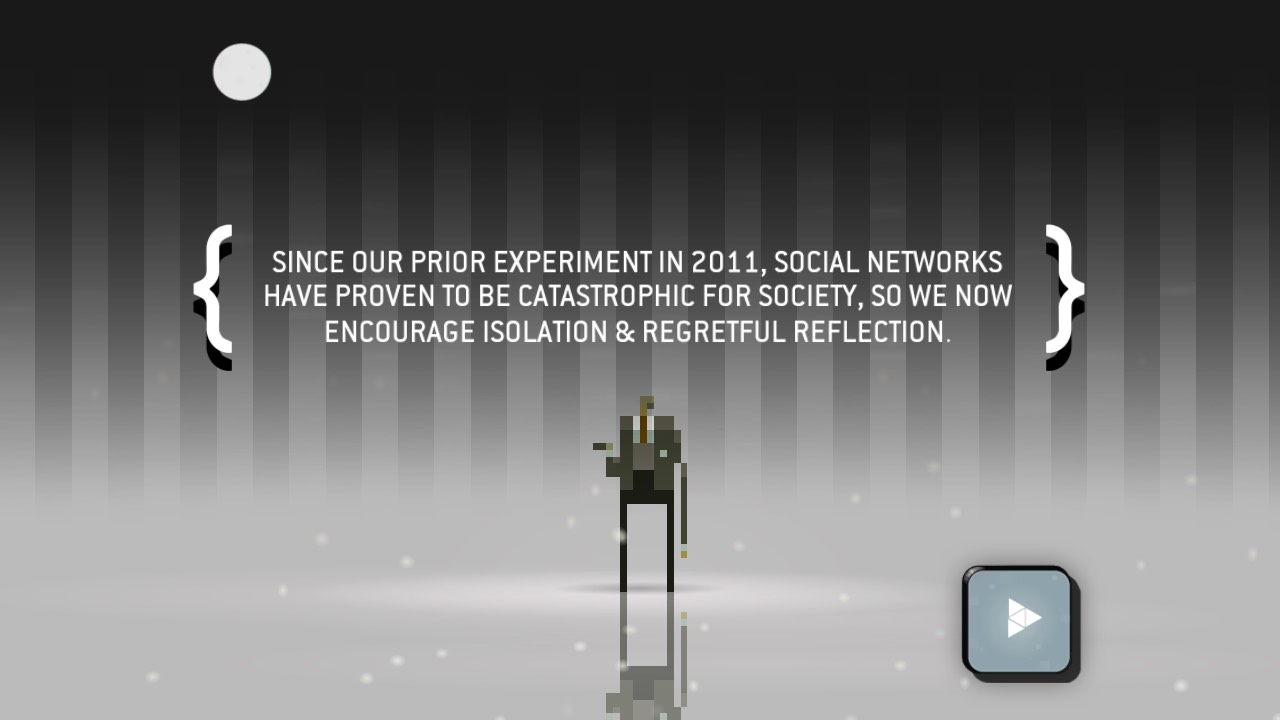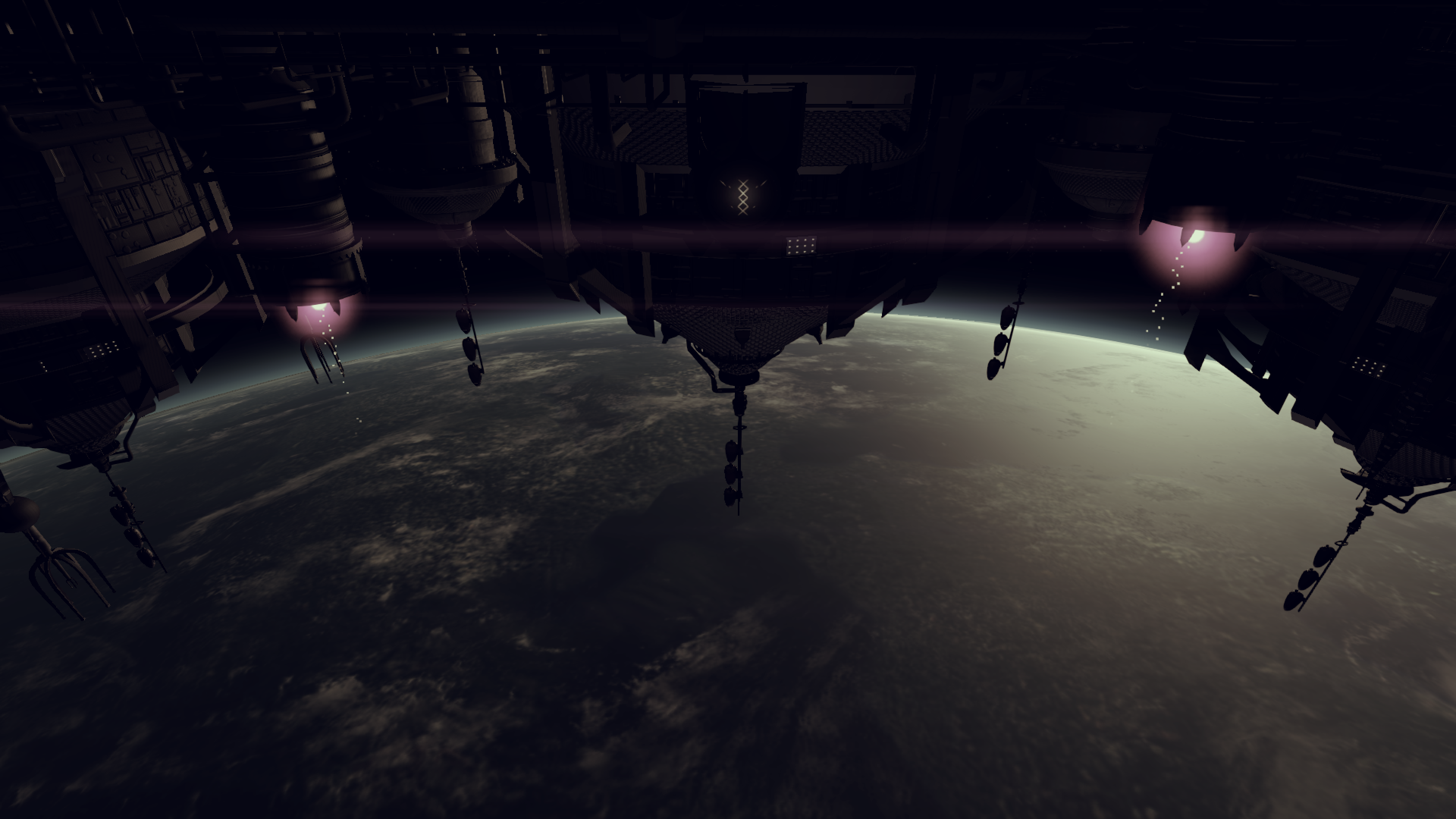When most developers release a genuine hit, they step into the spotlight. The release of Superbrothers: Sword & Sworcery EP in 2011 could have been that moment for designer Craig Adams. A pixelated journey equal parts beautiful and tragic, it was an early showcase for what was possible on two different mediums: mobile games and Twitter. It showed how touch-based video games could feel fundamentally good without buttons, and reflected the more playful and naive social media that defined an era that has since soured our culture.
Sword & Sworcery was a hit, but instead of approaching the spotlight, Adams ran into the woods of Canada while social media went to shit.
“That’s not too far off from the reality,” said Adams to me recently in an interview, “although it was a slightly more strategic move than ‘ran off’ implies.”
It’s been almost 10 years since Sword & Sworcery, but COVID-19 willing, Adams will release a new game later in 2020. Sony’s recent PlayStation 5 showcase was full of surprises, but the one that caused my heart to flutter was hearing the still-iconic ooOOoooah melody I’ve long associated with Sword & Sworcery’_s soundtrack. It accompanied the ambiguous reveal of a new sci-fi adventure called _JETT: The Far Shore.
The brief teaser for JETT didn’t show much, beyond suggesting a game about exploring worlds beyond Earth. What the player does in JETT is a mystery, and it’s not one Adams was keen to say much about yet, even though the game is supposedly coming this year.
Adams did tell me the game has been in active development since the summer of 2013, however, and noted the original ideas that helped inspire the foundation for JETT:
- Monster Hunter + Motorstorm = ?
- Skyrim + SSX3 = ?
- Metroid Prime + Wave Race 64 = ?
“There was this moment of exuberance in the early days of 3D video games in the 1990s where movement through a 3D space was itself novel and compelling,” said Adams, citing old PC games like Magic Carpet and Tie Fighter. “And I think JETT is aspiring to that.”
“So with JETT the spark is to keep the feel and fun of something like Motorstorm,” he added, “with the intricate, interesting, substantial design of Monster Hunter, to say yes to the player’s instinct to go fast and take jumps and offroad, and then to try to interleave some narrative-vibe focused scenes to soak in, so the player has interesting story concepts to contemplate while skimming around.”
JETT has been in development since 2013 in absolute silence, a rarity for modern game development, where things like early access and social media have encouraged games to be announced exceedingly early, and allowing fans to follow along for, quite often, years.
But nobody knew about JETT until a ooOOoooah announced it was coming from the beyond, and despite making it a centerpiece of Sword & Sworcery, Adams largely retreated from social media, where creators keep a presence between their projects. He does have a rarely used Twitter where, for example, he has expressed appreciation for Mars Attacks.
He’s right. Mars Attacks is good.
Sword & Sworcery released in a different world, when, as Adams put it, “iOS was kinda new, pixel art was still a little fresh, and Twitter was kinda fun.” It let players share snippets of the game’s notably weird and wall-breaking dialogue to their Twitter feed. It was at times, spammy, but it was genuinely delightful to share pieces of the game with your community:
“We spied a collection of graves in a thicket to the side of the old road & we wondered what was up with that.”“In a subterranean corridor we spied an ominous statue but we didn't worry too much about it.”
Adams and his collaborators at Capy Games would later remove this feature from the 2018 port of Sword & Sworcery to Switch, calling modern Twitter “a fraught, intense and frazzling stew even at the best of times.” The in-game fiction even had an explanation:

In 2012, just a year after Sword & Sworcery was released, some of the ideas for what would become JETT were percolating in Adams’ mind. It would have made sense to start talking about this, inspiring some articles about his future work, but he mostly walked away.
“I was far too online for a little while there in 2010 and 2011, and I don’t have the constitution or the temperament for it,” he said.
Most people don’t have the constitution or temperament for Twitter, but that doesn’t stop them from posting! It’s Twitter’s toxic fuel.
“I knew it [JETT] would take long years to complete,” he said. “It didn’t seem wise for me to attempt to maintain some public profile, so I made up my mind to go dark. I feel very fortunate that I had the option to do this.”
It was the success of Sword & Sworcery that gave Adams something unexpected: money to pay down his student debt, get married, and give the next steps in his life thought. Adams and his wife both wanted out of Toronto—and out of cities, more generally—and as part of his wife enrolling in a yearlong forestry program, they moved into a small town on the Ottawa river. His wife wanted a job that let her walk in the woods, and this got them closer.
“All of my dreams had come true, more or less,” he said. “So, I started to dream new dreams. I started by asking myself questions: What would be worth building? Who to build it with? How to build it in as stress-free a way as possible?”
Around this time, Adams contributed to the music rhythm game Sound Shapes, worked on the Japanese release of Sword & Sworcery, and began mulling what would become JETT. When his wife’s forestry program was winding down, they decided to move into a house their friends were selling, which was about as far away from city life as you could possibly get.
“It’s a stone-clad home with a nice fireplace, on the side of a little mountain, a few kilometers up a dirt road, with only woods and hills in view,” he said. “It’s plenty quiet here and it feels remote, and it’s a treat to be able to watch thunderstorms come in, and see the sun go down.”
In 2014, the couple welcomed a daughter into the world. In 2017, they had another. At one point, a major renovation was getting Adams a real office—he’d been working out of a bedroom—by converting part of the garage and a—wait for it—leftover sausage kitchen that was left in the house.
It was around this point that Adams has been working on JETT for a few years, but the origin story of JETT is earlier—back in 2007, in fact, and well before Sword & Sworcery. Adams met programmer Patrick McAllister and the two bonded, quickly noting they’d like to one day make a game together. The two would later meet by happenstance in Japan in the summer of 2012, share a few drinks, and reaffirm their desire to make that game they’d talked about.
Since the summer of 2013, the days have followed a familiar rhythm: Adams logs on as McAllister logs off, because one of them is working from Quebec and the other from Japan.
“The bulk of JETT’_s creation time it has been just Patrick and I, carving the concept out and building things up, trying things out,” said Adams. “Several quiet, very pleasant years of steady effort passed like this with us getting the _JETT aloft, pinning down the story, experimenting with world designs and gameplay scenarios, slowly finding our way in a too-broad design space.”
Both Sword & Sworcery and JETT have been made in somewhat unique circumstances.
Do you have any insight into this leak? Using a non-work phone or computer, you can contact Patrick Klepek securely on Signal on 224-707-1561, or email patrick.klepek@vice.com.
Adams had been quietly sculpting his ideas for Sword & Sworcery in private, and then a chance meeting with Capy Games revealed a tiny developer interested in partnering with other creatives. Adams pitched Sword & Sworcery, swiftly quit his job at another developer, and found himself directing two programmers at Capy on how to build this weird game. He wasn’t a Capy employee, but he was just making a game with their resources.
The financial success of Sword & Sworcery meant he could, again, just be quiet.
JETT also found itself in need of help in 2016, when Adams and McAllister had finished a prototype that showed off many of the game’s central elements: walking around, traveling in a craft, fighting a boss. The prototype was used to attract some other folks to work on the project, but as time went on and 2016 became 2017 and 2017 became 2018 and 2018 became 2019, Adams realized “it would be a real struggle for us to actually complete it.”
“Our savings were just about depleted,” said Adams, “and some existential dread was building up.”

They started shopping the game around and, as Adams puts it, “formed a partnership with PlayStation and Epic,” which provided money to bring on more people, including longtime Thief designer Randy Smith. (Smith has largely worked on mobile games in recent years.)
The extra eyes, ears, fingers, and brains has finally turned JETT from a concept into a game. The first four years or so of making JETT was Adams and McAllster in contemplative isolation. The last 18 months have, instead, been “a rollercoaster,” as the team has grown.
“I’ve struggled to be equal to what my role has lately become,” said Adams. “I’m now overseeing and directing and contributing on so many threads, while working together with colleagues and fellow producers to respond to obstacles and deadlines.”
The finish line does seem in sight, though. JETT is scheduled to come out this year on both PlayStation 4 and PlayStation 5, and we should know more about how it plays soon enough. Like many other parts of JETT, Adams is content waiting until the last second to step away.
“It has been a little surreal,” he said, “to be living the same life in the same house with no particular shift to my day-to-day — I still just go to my studio and switch on my computer — and yet JETT has gone from this tiny little secret thing, to this full blown international conspiracy, and now to this very for-real project that theoretically millions of people have sorta heard of. What a ride.”
Follow Patrick on Twitter. His email is patrick.klepek@vice.com, and available privately on Signal (224-707-1561).
from VICE https://ift.tt/30as1LO
via cheap web hosting
No comments:
Post a Comment